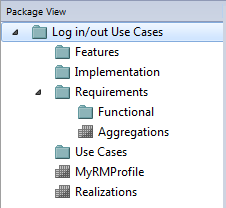Please note : This help page is not for the latest version of Enterprise Architect. The latest help can be found here.
Package Options
As you define the elements in your specification you can make them easier to reference by giving them more appropriate element names and/or numbers, either as the elements are created or retrospectively when a naming and numbering system has been finalized. You can also make the elements easier to locate and view by enabling level-numbering and indenting, helping you to organize and review the sequence and arrangement of the elements in the Specification Package. If you have been exploring other areas of the Project Browser, you can return focus to the Specification Package in the Project Browser.
You can also display a Package View panel to the left of the main view, showing the Package hierarchy of the current Specification Package. This also includes any Relationship Matrix profiles that exist in each Package.

Access Package | Specification Manager: ![]() <Package name>
<Package name>
Package | Specification Manager: ![]() (for Package View)
(for Package View)
Configure Package options
Option |
Description |
See also |
|---|---|---|
Locate Current in Project Browser |
Click on this option to highlight the name of the Specification Package in the Project Browser.
|
|
Apply Auto Naming to Elements |
If you had to create elements before setting up an auto-naming and/or auto-numbering system, you can select this option to apply the system to the existing elements retrospectively. If you set up an auto-naming and/or auto-numbering system before creating your elements, that system is automatically applied as you create the elements. |
Apply Auto Naming to Existing Elements Set Auto Naming and Auto Counters
|
Level Numbering - Enable
- Indent Description |
Click on this option to apply level numbering to the elements in the Specification Package and indent each successive level, both in the Specification Manager and in the Project Browser. Nested elements are numbered hierarchically; that is: 1 Name The option in the Specification Manager is the same as the option in the Project Browser Package context menu; turning the option on or off in one window also turns the option on or off in the other.
|
|
If you have enabled level numbering, this option is available to indent the element description under each element name, to align with the element name. If the option is not selected, the text is aligned with the left-hand edge of the level number. For example: Option ON: 1 Name
Option OFF: 1 Name |
|
Package View panel
Option |
Description |
See also |
|---|---|---|
Expand or collapse the hierarchy
|
Click on the white (expand) or black (collapse) arrows to the right of the Package name. |
|
Locate a Package in Project Browser
|
Right-click on the Package name and select the Find in Project Browser option. |
|
Make a Package the focus of the display
|
Click on the Package name in the hierarchy. |
|
Make a Package the Root Specification Package
|
Right-click on the Package name and select the Set Package as Root option. The display adjusts to show the selected Package at the top level of the hierarchy. |
|
Add a new child Package |
Right-click on the Package name and select the New Package option. The New Package dialog displays, on which you start to define the new Package.
|
|
Refresh the View |
Press F5.
|
|
Open Relationship Matrix for a Package |
Right-click on the Package name and select the Open Relationship Matrix option. A further submenu displays, from which you select to make the Package the source, target or both in the Relationship Matrix.
|
|
Enact a Relationship Matrix Profile |
Double-click on the Relationship Matrix profile name. It is enacted and displayed in the main View.
|
|
Notes
| · | In the Corporate and extended editions of Enterprise Architect, a User Security system can be applied that restricts or enables access to a range of operations and functions; if you cannot access a function in the Specification Manager, check with your System Administrator or Security Administrator to see if you have access permissions to work with that function |
Learn more









